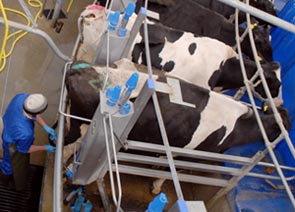Dairy delivers health benefits say scientists
Release Date 16 April 2014

Dairy research and industry are key to tackling some of the world's health and environmental challenges. That was the message to emerge from a meeting of scientists and food industry experts at the University of Reading this week.
The symposium,‘Healthy Cows. Healthy Humans, Healthy Planet', on April 16, was organised by the University of Reading and the National Milk Records, highlighting research funded by the Biotechnology & Biological Sciences Research Council (BBSRC), the Diet and Health Research Industry Club (DRINC), the Medical Research Council (MRC), Technology Strategy Board and Dairy Co.
The event provided the latest review of the evidence on the role dairy foods and milk can play in keeping people fit and healthy and preventing vascular disease, such as heart attacks and strokes - Europe's biggest killer illness. The symposium also examined the health of the dairy cow and the environmental effects of milk production such as reducing carbon emissions.
Some of the leading experts on human nutrition, veterinary science and the dairy food supply chain spoke at the conference, updating delegates from around the EU on the latest developments in the field.
University of Reading's cutting-edge research was a prominent feature of the symposium. Delegates heard about Reading's work in reducing saturated fatty acids (SFA) in the UK diet. By changing a dairy cow's diet researchers showed that SFA in milk could be reduced from 70% to 50% of total fatty acids. These findings have paved the way for Reading experts to begin a new project involving human participation. Funded by the Medical Research Council, the study will examine whether or not SFA -reduced milk will reduce the risk of cardiovascular diseases (CVD).
Reading is also involved in a BBSRC/Volac funded study on the effect of milk proteins on blood pressure and other measures of vascular health. Another project, funded by DairyCo and The Dairy Council, aims to evaluate the balance between the nutritional effects of dairy consumption in UK diets and the associated environmental and financial costs of producing dairy foods.
Other topics discussed included modern approaches for maintaining dairy cow health and the role of the dairy supply chain for ensuring a sustainable healthy future. Delegates heard from Professor Patrick Wall, Associate Professor of Public Health in University College Dublin's School of Public Health and Population Sciences, and Dr Judith Bryans, Chief Executive of Dairy UK
Professor Ian Givens, Co-organiser of the event and University of Reading's DRINC project leader, said:
"Milk and dairy products remain a crucial part of our diet, but the legacy of health scares, misinformation, and a lack of investment in research in the past has left the public confused about whether dairy products are helpful or harmful to their health," Professor Givens said.
"Considering the importance that consumers are now placing on diet and health when making purchasing decisions, it is no surprise that there is an increased focus on research into dairy foods and health.
"Here at Reading we are fortunate to have a depth and breadth of expertise across the entire food chain, all the way from farm to consumer, making Reading the ideal place to examine how changes to food production affect human health, the environment and business."
ENDS
